Chalk it up to the food, the swift and efficient public transportation that gets you where you need to be, or the changing of the seasons as the trees take on the most vibrant colours. Fact is, many people love South Korea, and some love it just enough to pack their lives into a suitcase and start a new life there. We talked to two women from the Philippines who felt called to work in the Land of the Morning Calm, and they tell us what they love most about their second home and where their journey has taken them so far.
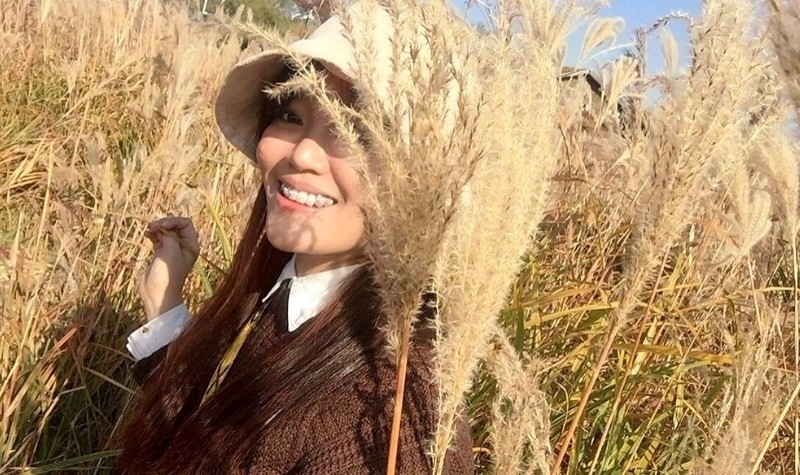
Ayra Lee, who works as a missionary-teacher in Gwacheon, has been living in South Korea for four years. | Image credit: Ayra Lee
Ayra Lee is a 31-year-old Filipina who has been living in South Korea since 2016. She works as a teacher and a missionary in Gwacheon City in Gyeonggi Province. Over the course of her four-year stay, Ayra has come to appreciate Korean food, taking a liking to its health benefits and well-balanced ingredients consisting of herbs, grains, fruits, and vegetables. But what she enjoys most are the changing seasons in South Korea. “Spring is my favourite [season], but fall is South Korea’s best season,” Ayra says.
South Korea also has a number of perks that make Ayra’s day-to-day routine a little easier. Ayra is thankful for the safe and reliable public transportation system, the free public WiFi and high-speed internet connection, the low crime rates, and the excellent medical care provided by Korean hospitals, which benefit from state-of-the-art equipment and high-quality health services.
Working as a teacher in South Korea’s “palli-palli” culture
That’s not to say that living in South Korea is without its challenges. Ayra confesses that the fast-paced lifestyle, or what is famously known as the “palli-palli” culture, took some adjustment on her part. “Palli-palli,” a Korean expression that means “quickly,” applies to the smallest daily routines like walking down the street to the technological innovations that make everything work so smoothly throughout the country. “Koreans tend to be very quick in whatever they do,” Ayra says.
Similarly, the work culture in South Korea is also defined by swiftness and efficiency, which comes with the silent expectation to put in more hours at the office. “I work more than 10 hours a day,” Ayra says. There is also a strong hierarchy of age and position when it comes to interacting with seniors. “Elders should be respected even if they don’t respect the young ones in return.”
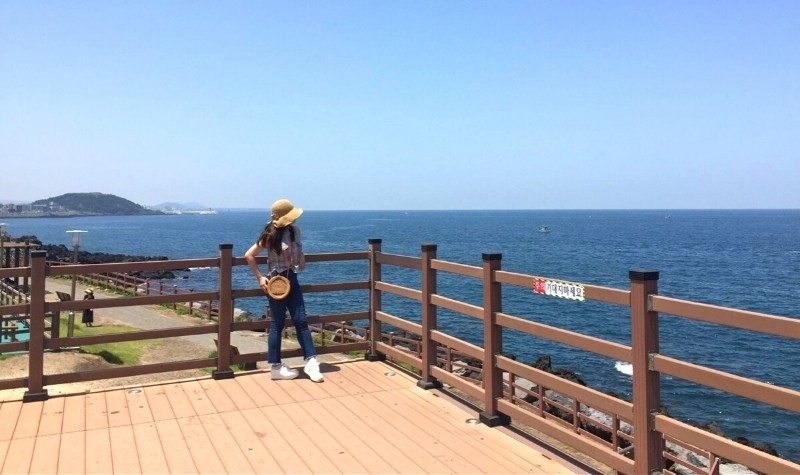
Ayra Lee’s favourite place to visit is Jeju Island, a volcanic island and popular holiday destination among locals. | Image credit: Ayra Lee
One upside to working in South Korea though, at least, in Ayra’s experience, has been her generous work package. Her employers provide her “free housing, complete with furniture and appliances, and health insurance coverage.” On top of these considerable benefits, she also gets 10 to 15 days of leave and a free round-trip ticket to the Philippines, her home country, once every year.
The importance of beauty and style
From hydrating face masks to 10-step skincare regimens resulting in glossy, luminous skin, Korean beauty or K-beauty is a cultural phenomenon that has emerged as a global trend with its own staunch believers. According to BBC News, Korean women spend twice as much on skincare and K-beauty products than Americans; and so do Korean men, who spend more on their personal care and grooming than men from any other country in the world. However, there’s a little-known impact to South Korea’s dedication to beauty, as well as the massive industry surrounding it.
In South Korea, there is a societal expectation for women to look beautiful. Flawless appearances are perceived as crucial to a person’s success in their career, relationships, and overall well-being. Commenting on another person’s appearance or telling them point-blank that they look a certain way might be well-intentioned or even construed as a welcome gesture of honesty, depending on what kind of comment is given. But for some foreigners who might feel protective or sensitive about their physical looks, South Korea’s straightforward attitude to beauty might come as a shock at first.
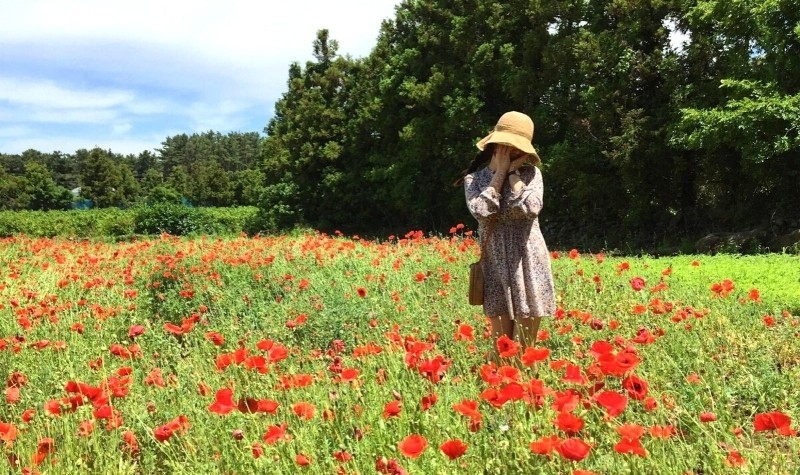
Ayra Lee standing in a field of red poppies on Jeju Island. | Image credit: Ayra Lee
“Everything you do in this country depends on how you look,” Ayra says, who noticed the singular attention given to personal appearance and taking care of oneself. “Every time I meet my students’ mothers, they’ll tell me how big my eyes are, or how skinny [I am] or how fat [I’ve become].”
For women in South Korea, there’s a certain pressure to keep up with the beauty standards and spend more on skincare, make-up, clothes, bags, and shoes, even if the high-quality brands also tend to be the more expensive ones. “People here really care about fashion,” Ayra adds. “For you to look good in their eyes, you have to be dressed up nicely, even if you are just going to 7-Eleven.”
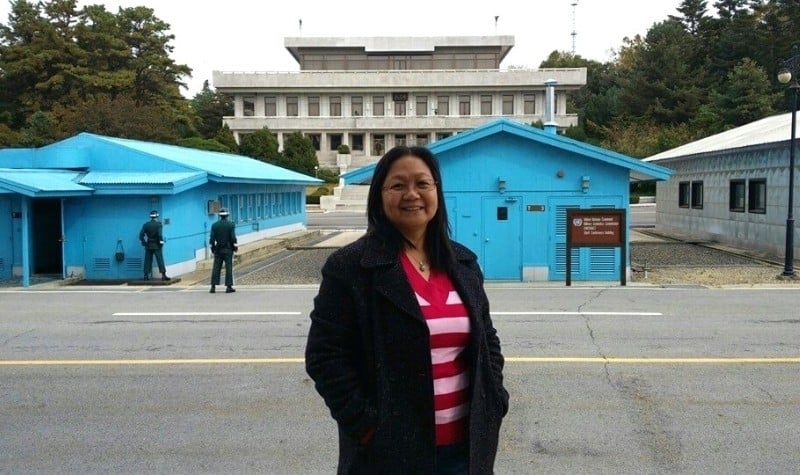
After 12 years of teaching in Korean universities, Dr. Emely Dicolen fell in love with the culture, the food, and the people. | Image credit: Dr. Emely Dicolen
When Dr. Emely Dicolen was granted a one-year research scholarship at the Korea Foundation for Advanced Studies in 2004, she seized the opportunity to serve the Filipino community in South Korea as a lay missionary at the Archdiocesan Pastoral Center for Filipino Migrants. From there, she pursued a prolific teaching career at South Korea’s universities.
Her first teaching job was at the Hankuk University of Foreign Studies, where she taught Filipino language and culture to Kookmin Bank executives under the university in 2008. She went on to teach different courses as a full-time professor at three more universities: Global English and International Business at the Catholic University of Korea from 2009 to 2011, English at Gyeongju University from 2011 to 2012, and social welfare at the Catholic University of Daegu from 2012 to 2016.
Falling in love with Gyeongju, the open-air museum
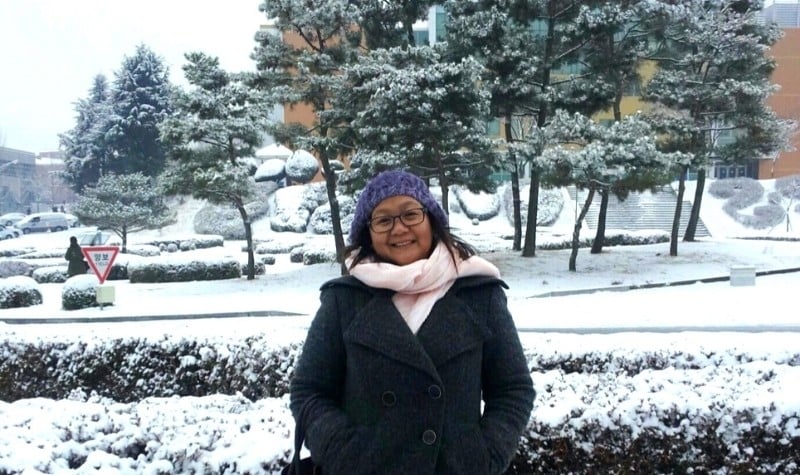
In Gyeongju City, which is home to several UNESCO World Heritage Sites, Dr. Emely Dicolen found a place where traditional Korean culture is preserved. | Image credit: Dr. Emely Dicolen
Dr. Dicolen was privileged to live in many places in South Korea, as her fruitful 12-year career as a lay missionary and educator would take her from Seoul to Daegu. But her favourite place to explore, she tells me, is the historic city of Gyeongju, which is often called an “open-air museum” or “a museum without walls.”
Formerly the capital of the Silla Dynasty, Gyeongju is home to the tombs of Korea’s kings and queens, as well as historic areas that have collectively been designated UNESCO World Heritage Sites. “If you want to know about Korean history, you should go to Gyeongju,” she says. It’s dotted with Buddhist temples, serene hills and bridges, traditional restaurants, and charming hanok villages that can make any visitor feel like they’ve travelled centuries back in time.
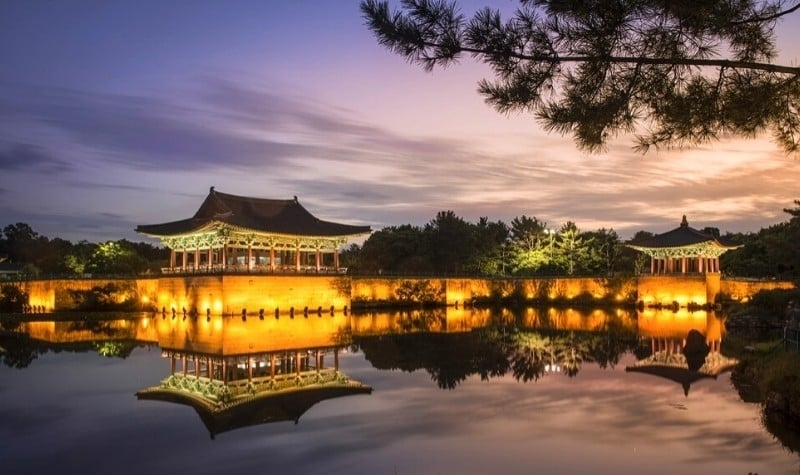
Donggung Palace and Wolji Pond in Gyeongju City
More than the respect for cultural heritage, what left a strong impression on Dr. Dicolen was the abundance of public libraries and cultural centres in South Korea. “Everywhere you go, there’s a museum,” she recalls, pointing out that it was not uncommon to encounter new exhibits of paintings at the subway stations or see a violinist playing music on the street. “[Koreans] maximise every single space to promote their culture.”
Looking at the country through her eyes, South Korea becomes a place of enrichment and discovery, where an appreciation for the arts and history can blend in with everyday life. That’s another thing Dr. Dicolen loves about South Korea: the extent to which their traditional culture has been carefully preserved, so that it can be appreciated for future generations to come.
Cleanliness and discipline
Like many travellers, Dr. Dicolen praises the country’s food, the clean streets and public parks, and the efficiency of the transportation system. “People are really disciplined. They take care of their public places for everyone to enjoy,” Dr. Dicolen says, though she notes one exception: Saturday morning, where the leftovers from last night’s partying and drinking sessions are strewn all over the street, occasionally with the sight of someone throwing up in the early hours of the day. But even that, she adds, is quickly cleaned up to leave no trace.
Making friends with the locals and understanding the nuances of their culture
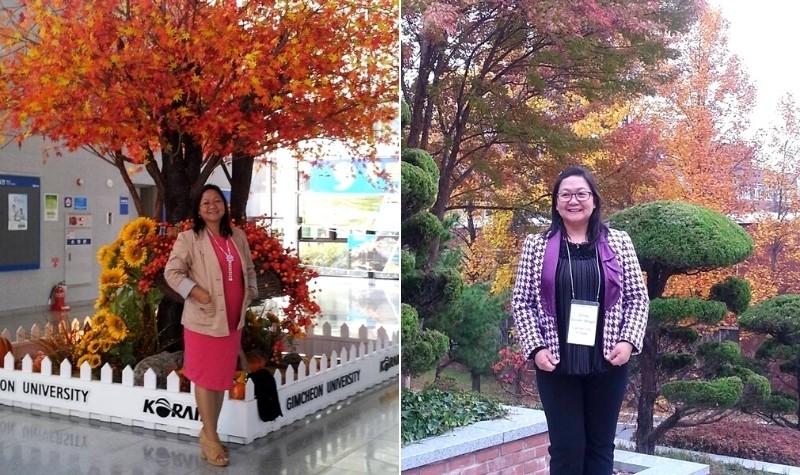
“People are really disciplined. They take care of their public places for everyone to enjoy,” Dr. Emely Dicolen says. | Image credit: Dr. Emely Dicolen
Saving face and keeping the peace are just as important as showing respect to superiors, be it in the workplace or interpersonal relationships. During our conversation, Dr. Dicolen brings up the idea of “kibun,” a concept in Korean culture that has no literal translation in English yet affects nearly every aspect of social life. The closest words we have for it in English are “pride” or “personal dignity,” but even these don’t fully capture just how important it is for South Koreans and their interactions with others.
Personal relationships in South Korea value the preservation of harmony in social situations. This means showing people the proper respect in order to avoid embarrassment and maintain a comfortable atmosphere. Non-verbal communication is used to convey politeness, like paying attention to someone’s body language or listening to their tone of voice. Protecting this social harmony is just as important in a business setting, where it can be considered impolite or almost offensive to speak out against your superiors, and any kind of personal confrontation that leads to someone losing face is frowned upon.
Also read: How a Filipino Made His Dream of Moving to South Korea a Reality
Despite the many challenges that come with living in South Korea as a foreigner, Dr. Dicolen treasures the time she spent there. After 12 years of living abroad, she came home to the Philippines in 2016. But in the brief time we talked together, there’s no question that she looks back on her experiences in South Korea with fond memories for her second home.
“I enjoyed the people. I have a lot of Korean friends,” Dr. Dicolen says. “Pag nakuha mo yung loob nila, they can be very, very good friends.” [Once you really get to know the locals, and if you can earn their trust, the deep bonds you create can last a lifetime.]




